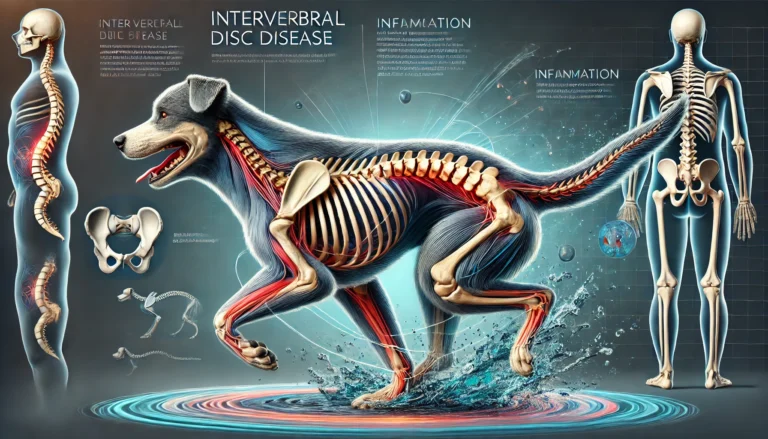Ivermectin Toxicity in Dogs – The Best Guide about it

introduction to Ivermectin Toxicity in Dogs
Ivermectin Toxicity, a drug well-known for its effectiveness against a variety of parasites, is a staple in veterinary medicine. This article provides a thorough examination of ivermectin, its uses for preventing heartworm and treating parasites, and the serious issue of ivermectin toxicity in dogs.
Ivermectin:
Ivermectin is a member of the avermectin family of drugs, which act on the nervous systems of parasites. From preventing heartworm disease to treating mites, and lice, the applications of ivermectin for dogs are extensive and varied. This section delves into how ivermectin is used and the science behind its effectiveness.
How Ivermectin Works in Dogs
The effectiveness of ivermectin is due to its ability to paralyze and ultimately eradicate parasites. Here, we detail the drug’s mechanism of action, exploring how it disrupts neural and muscular function in parasites, which is crucial for pet owners to understand.
The Spectrum of Ivermectin Use in Dogs
While its primary use is in the prevention of heartworm, ivermectin is also employed to combat other parasites such as ticks and mites. This segment covers the range of applications of ivermectin in canine treatment plans, including doses and administration methods.
Recognizing Ivermectin Toxicity in Dogs
Despite its benefits, ivermectin can be dangerous, even lethal, under certain conditions. This crucial section discusses how toxicity occurs, the signs of overdose, and the breeds that are more susceptible due to genetic predisposition.
Symptoms of Ivermectin Toxicity
Symptoms of toxicity range from mild to severe, such as vomiting, dilated pupils, unsteadiness, seizures, coma, and sometimes death. We provide a comprehensive guide on recognizing these symptoms early to prevent fatal outcomes.

Diagnosing Ivermectin Toxicity
When a dog presents symptoms that suggest ivermectin toxicity, accurate diagnosis is crucial. This section outlines the steps veterinarians take to diagnose the condition, including the tools and tests commonly used.
Effective Treatments for Ivermectin Overdose
Should a dog suffer from ivermectin toxicity, prompt and effective treatment is crucial. This part of the article discusses the treatments available, including stomach pumping, activated charcoal, supportive care, and more.
do you know
Cushing’s disease is a complex medical condition that affects both humans and animals, particularly dogs.
Recovery and Management Post-Toxicity
Surviving ivermectin toxicity is just the first step. This section discusses the recovery process, potential complications, and how to manage a dog’s health after an episode of toxicity to ensure no long-term damage.
Preventing Ivermectin Toxicity
Prevention is always better than cure. Here, we explore how proper dosing and awareness can prevent toxicity, including the importance of genetic testing for breeds at risk.
The Role of Pet Owners in Managing Medication
The final part emphasizes the critical role pet owners play in managing their pets’ medications, recognizing signs of distress, and consulting with veterinarians to use ivermectin safely.
Conclusion of Ivermectin Toxicity in Dog
Concluding the discussion, this section summarizes the key points covered, reaffirming the importance of ivermectin in veterinary care when used correctly, and the need for awareness about its potential risks.
What happens if you give a dog too much ivermectin?
Overdosing a dog with ivermectin can lead to toxicity, causing symptoms such as vomiting, dilated pupils, unsteadiness, seizures, or even coma.
What dog breed is ivermectin toxic to?
Ivermectin is particularly toxic to breeds with the MDR1 gene mutation, including Collies, Australian Shepherds, and Long-haired Whippets, among others.
How much ivermectin to give a dog?
The dose of ivermectin depends on the dog’s weight and the condition being treated but typically ranges from 0.006 to 0.012 mg/kg for heartworm prevention.
What is the mechanism of ivermectin toxicity?
Ivermectin toxicity occurs when the drug crosses the blood-brain barrier, affecting the central nervous system by enhancing inhibitory neurotransmission.
How is ivermectin cleared from the body?
Ivermectin is primarily metabolized in the liver and excreted in the feces over an extended period, with minor amounts appearing in the urine.
What are the neurotoxic effects of ivermectin?
Neurotoxic effects can include tremors, seizures, ataxia, disorientation, blindness, coma, and potentially death due to its impact on GABAergic and glutamatergic neurotransmission.
What does ivermectin do to the brain?
In cases of toxicity, ivermectin can affect the brain by interfering with neural transmission, leading to an increase in GABA-mediated nerve impulses that can paralyze and kill parasites but also harm the host if the blood-brain barrier is compromised.
What is an adverse reaction to ivermectin?
Adverse reactions to ivermectin can include skin rash, nausea, vomiting, diarrhea, stomach pain, facial or limb swelling, neurologic adverse events (dizziness, seizures, confusion), sudden drop in blood pressure, severe skin rash potentially requiring hospitalization, and liver injury (hepatitis).
Is ivermectin hazardous?
Ivermectin is generally safe for most dogs when used as prescribed but can be hazardous, especially to certain breeds or dogs with compromised liver function, or when administered improperly.






